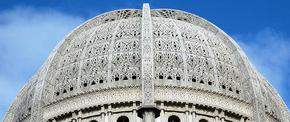The views expressed in our content reflect individual perspectives and do not represent the official views of the Baha'i Faith.
When Abdu’l-Baha visited North America in 1912, he said that the United States would eventually “lead all nations spiritually:”
The American continent gives signs and evidences of very great advancement; its future is even more promising, for its influence and illumination are far-reaching, and it will lead all nations spiritually. – Abdu’l-Baha, The Promulgation of Universal Peace, p. 104.
Today, considering the phrase “lead all nations spiritually” that Abdu’l-Baha used to describe the United States of America, many doubt that it could ever happen. People all over the world look at America and its problems, and for every one good thing they see two bad, like the old cliché “One step forward and two back.”
I don’t happen to see it that way.
No one can deny that some of America’s problems seem intractable. Many believe that humanity’s selfish nature will never change. Yet I’m firmly convinced that America and the world have changed for the better—and that greater improvements are in store for us when we act with unity to change both ourselves as a nation and the world around us.
During the past two centuries, despite poverty, despite disease, despite lack of education, despite racism, unfairness and injustice, despite political divisiveness and more, the world’s peoples have made tremendous progress forward in every way: materially, scientifically, morally, democratically, even spiritually. Still, though, we tend to see the bad and overlook the good.
That applies to United States as well. With a history of slavery and war, genocidally killing its Indigenous peoples and suppressing their ways, poor treatment of women, a history of moral laxity and corruption, and an obsession with material things and entertainment, it’s hard to hold up the country as a paragon of virtue.
But, in all fairness, the United States has accomplished important milestones in the past, and its future as a bastion of fairness, freedom and democracy looks bright. Abdu’l-Baha said so during a speech he gave in Washington, D.C. in April of 1912:
May this American democracy be the first nation to establish the foundation of international agreement. May it be the first nation to proclaim the universality of mankind. May it be the first to upraise the standard of the Most Great Peace, and through this nation of democracy may these philanthropic intentions and institutions be spread broadcast throughout the world. Truly, this is a great and revered nation. Here liberty has reached its highest degree. The intentions of its people are most praiseworthy. They are, indeed, worthy of being the first to build the Tabernacle of the Most Great Peace and proclaim the oneness of mankind. – Abdu’l-Baha, The Promulgation of Universal Peace, pp. 36-37.
A month later, in Cleveland, Ohio, Abdu’l-Baha issued a powerful challenge to the United States—to lead the warring nations of the world to peace:
It is my hope that this just government will stand for peace so that warfare may be abolished throughout the world and the standards of national unity and reconciliation be upraised. This is the greatest attainment of the world of humanity. This American nation is equipped and empowered to accomplish that which will adorn the pages of history, to become the envy of the world and be blest in the East and the West for the triumph of its democracy. – Ibid., p. 103.
During that same period of history, President Woodrow Wilson’s 14-Point Plan for Peace, initiated in a speech on January 8, 1918, led to the concept of a League of Nations. In that same speech, Wilson promoted free trade, open agreements, democracy and self-determination. Wilson’s Plan said:
A general association of nations must be formed under specific covenants for the purpose of affording mutual guarantees of political independence and territorial integrity to great and small states alike.
Ultimately the League of Nations failed under the assault of Nazism and fascism, but the United Nations was established in San Francisco in 1947 after WWII with America’s significant support, and New York City chosen for its headquarters—fulfilling Abdu’l-Baha’s prophecy that the United States become “… the first nation to establish the foundation of international agreement.”
The list of American accomplishments since then is long: scientific breakthroughs in space and medicine; the general educational level and overall literacy of its peoples; its promotion of the rule of law; its long history of a free press and democratic government by the people. We should also not forget that the United States’ intervention in two world wars ended those conflicts; and that its prosperity and success have made it a superpower economically, educationally and politically.
Shoghi Effendi, the Guardian of the Baha’i Faith, called the statement that America would lead all nations spiritually:
Among some of the most momentous and thought-provoking pronouncements ever made by Abdu’l-Baha, in the course of His epoch-making travels in the North American continent …. – The Advent of Divine Justice, p. 86.
America is more than a name, a nation, or even an ideal. It is its people, resources, spirit of exploration and invention, laws, and civilization. Millions of people all over the world dream of living within its borders. It holds the hope that wrongs will be righted, justice will reign, and doing the right thing means doing the thing right. It promises the hope of better things, better lives, and a better world.
So how did America achieve its unprecedented role? Most importantly, how do we make it better? How do we create a country that will one day live up to its role of leading all nations spiritually? In the concluding essay in this two-part series, we’ll dive into those crucial questions.

















Comments
Sign in or create an account
Continue with Facebookor